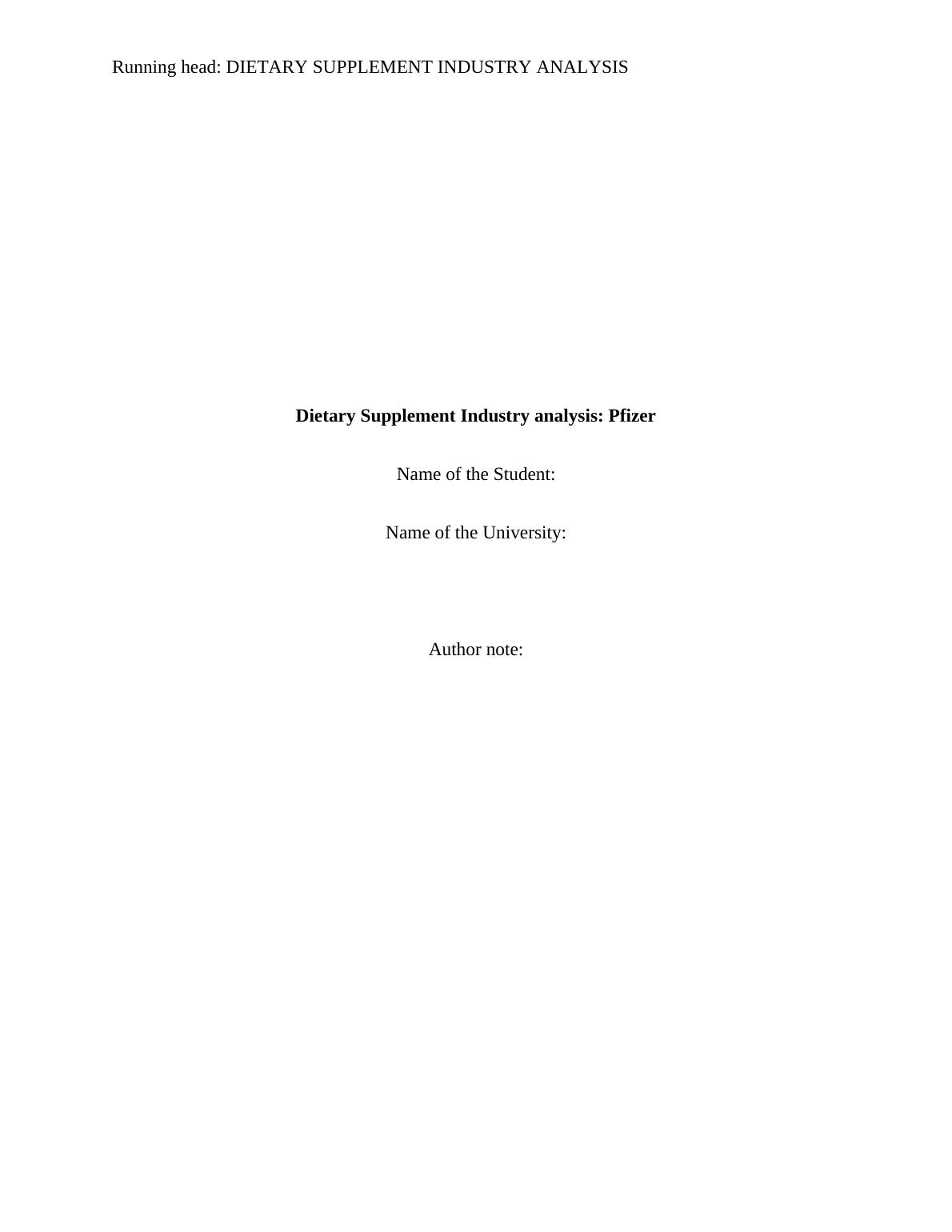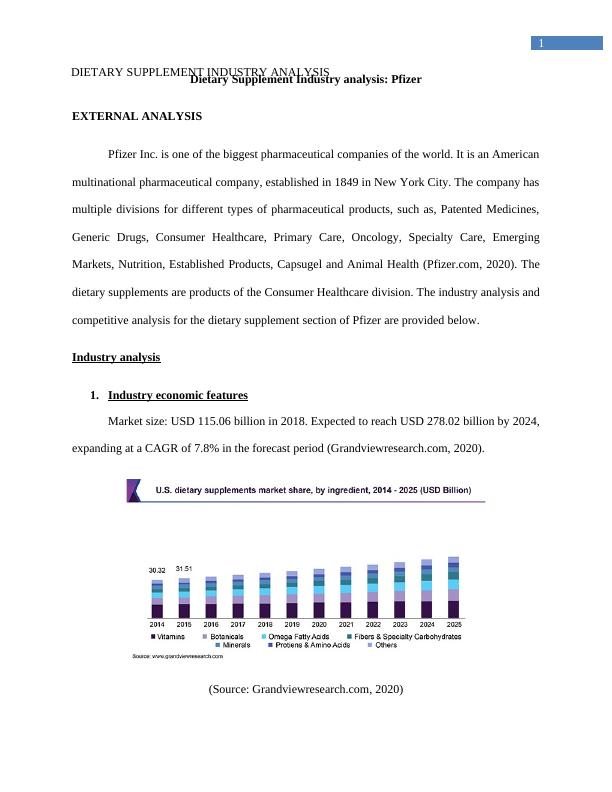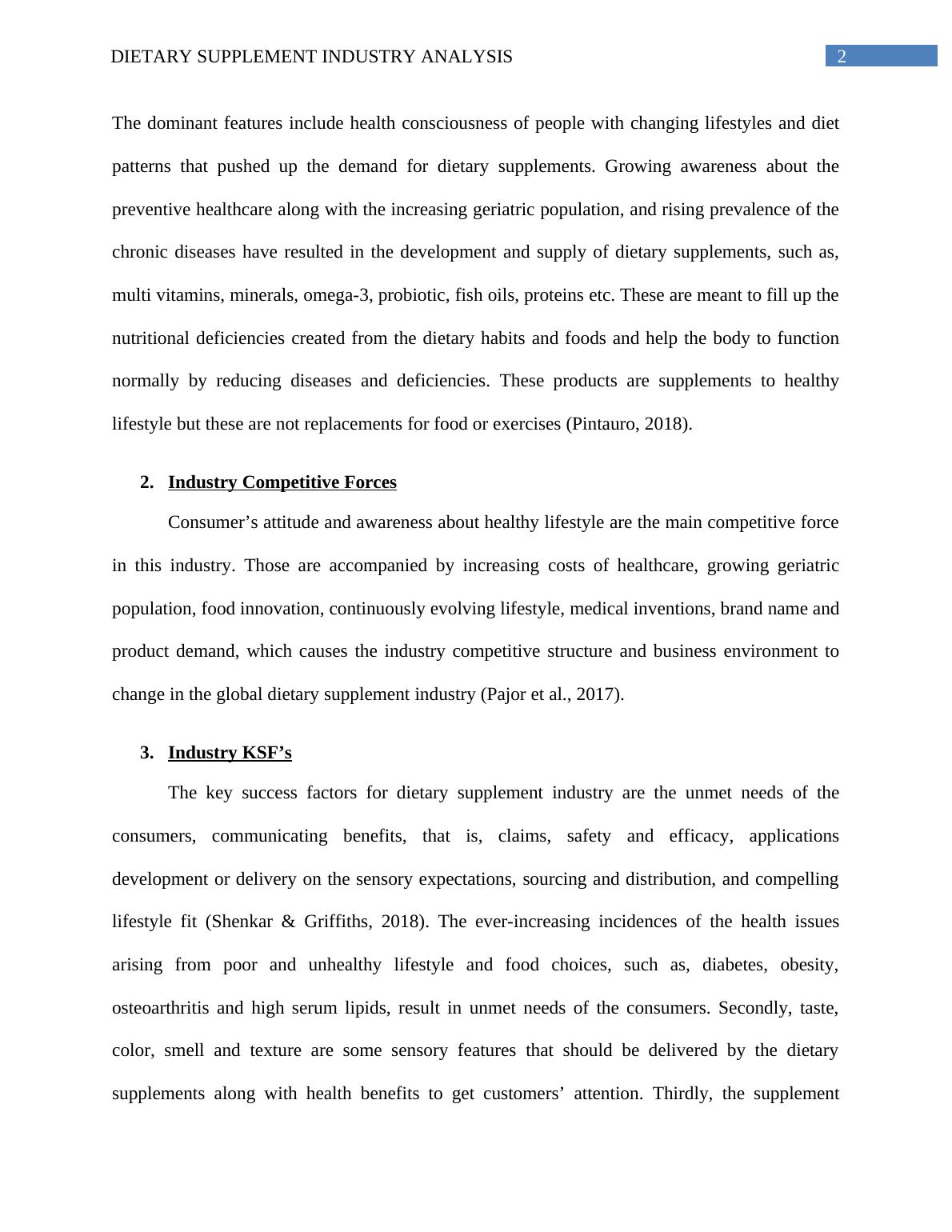Dietary Supplement Industry Analysis
Added on 2022-08-24
8 Pages1316 Words23 Views
Running head: DIETARY SUPPLEMENT INDUSTRY ANALYSIS
Dietary Supplement Industry analysis: Pfizer
Name of the Student:
Name of the University:
Author note:
Dietary Supplement Industry analysis: Pfizer
Name of the Student:
Name of the University:
Author note:

1
DIETARY SUPPLEMENT INDUSTRY ANALYSIS
Dietary Supplement Industry analysis: Pfizer
EXTERNAL ANALYSIS
Pfizer Inc. is one of the biggest pharmaceutical companies of the world. It is an American
multinational pharmaceutical company, established in 1849 in New York City. The company has
multiple divisions for different types of pharmaceutical products, such as, Patented Medicines,
Generic Drugs, Consumer Healthcare, Primary Care, Oncology, Specialty Care, Emerging
Markets, Nutrition, Established Products, Capsugel and Animal Health (Pfizer.com, 2020). The
dietary supplements are products of the Consumer Healthcare division. The industry analysis and
competitive analysis for the dietary supplement section of Pfizer are provided below.
Industry analysis
1. Industry economic features
Market size: USD 115.06 billion in 2018. Expected to reach USD 278.02 billion by 2024,
expanding at a CAGR of 7.8% in the forecast period (Grandviewresearch.com, 2020).
(Source: Grandviewresearch.com, 2020)
DIETARY SUPPLEMENT INDUSTRY ANALYSIS
Dietary Supplement Industry analysis: Pfizer
EXTERNAL ANALYSIS
Pfizer Inc. is one of the biggest pharmaceutical companies of the world. It is an American
multinational pharmaceutical company, established in 1849 in New York City. The company has
multiple divisions for different types of pharmaceutical products, such as, Patented Medicines,
Generic Drugs, Consumer Healthcare, Primary Care, Oncology, Specialty Care, Emerging
Markets, Nutrition, Established Products, Capsugel and Animal Health (Pfizer.com, 2020). The
dietary supplements are products of the Consumer Healthcare division. The industry analysis and
competitive analysis for the dietary supplement section of Pfizer are provided below.
Industry analysis
1. Industry economic features
Market size: USD 115.06 billion in 2018. Expected to reach USD 278.02 billion by 2024,
expanding at a CAGR of 7.8% in the forecast period (Grandviewresearch.com, 2020).
(Source: Grandviewresearch.com, 2020)

2
DIETARY SUPPLEMENT INDUSTRY ANALYSIS
The dominant features include health consciousness of people with changing lifestyles and diet
patterns that pushed up the demand for dietary supplements. Growing awareness about the
preventive healthcare along with the increasing geriatric population, and rising prevalence of the
chronic diseases have resulted in the development and supply of dietary supplements, such as,
multi vitamins, minerals, omega-3, probiotic, fish oils, proteins etc. These are meant to fill up the
nutritional deficiencies created from the dietary habits and foods and help the body to function
normally by reducing diseases and deficiencies. These products are supplements to healthy
lifestyle but these are not replacements for food or exercises (Pintauro, 2018).
2. Industry Competitive Forces
Consumer’s attitude and awareness about healthy lifestyle are the main competitive force
in this industry. Those are accompanied by increasing costs of healthcare, growing geriatric
population, food innovation, continuously evolving lifestyle, medical inventions, brand name and
product demand, which causes the industry competitive structure and business environment to
change in the global dietary supplement industry (Pajor et al., 2017).
3. Industry KSF’s
The key success factors for dietary supplement industry are the unmet needs of the
consumers, communicating benefits, that is, claims, safety and efficacy, applications
development or delivery on the sensory expectations, sourcing and distribution, and compelling
lifestyle fit (Shenkar & Griffiths, 2018). The ever-increasing incidences of the health issues
arising from poor and unhealthy lifestyle and food choices, such as, diabetes, obesity,
osteoarthritis and high serum lipids, result in unmet needs of the consumers. Secondly, taste,
color, smell and texture are some sensory features that should be delivered by the dietary
supplements along with health benefits to get customers’ attention. Thirdly, the supplement
DIETARY SUPPLEMENT INDUSTRY ANALYSIS
The dominant features include health consciousness of people with changing lifestyles and diet
patterns that pushed up the demand for dietary supplements. Growing awareness about the
preventive healthcare along with the increasing geriatric population, and rising prevalence of the
chronic diseases have resulted in the development and supply of dietary supplements, such as,
multi vitamins, minerals, omega-3, probiotic, fish oils, proteins etc. These are meant to fill up the
nutritional deficiencies created from the dietary habits and foods and help the body to function
normally by reducing diseases and deficiencies. These products are supplements to healthy
lifestyle but these are not replacements for food or exercises (Pintauro, 2018).
2. Industry Competitive Forces
Consumer’s attitude and awareness about healthy lifestyle are the main competitive force
in this industry. Those are accompanied by increasing costs of healthcare, growing geriatric
population, food innovation, continuously evolving lifestyle, medical inventions, brand name and
product demand, which causes the industry competitive structure and business environment to
change in the global dietary supplement industry (Pajor et al., 2017).
3. Industry KSF’s
The key success factors for dietary supplement industry are the unmet needs of the
consumers, communicating benefits, that is, claims, safety and efficacy, applications
development or delivery on the sensory expectations, sourcing and distribution, and compelling
lifestyle fit (Shenkar & Griffiths, 2018). The ever-increasing incidences of the health issues
arising from poor and unhealthy lifestyle and food choices, such as, diabetes, obesity,
osteoarthritis and high serum lipids, result in unmet needs of the consumers. Secondly, taste,
color, smell and texture are some sensory features that should be delivered by the dietary
supplements along with health benefits to get customers’ attention. Thirdly, the supplement

End of preview
Want to access all the pages? Upload your documents or become a member.
Related Documents
Business Analytics Principles Report 2022lg...
|20
|2619
|24
Vitamin B12 Deficiency in Vegan Diets: Myth or Reality?lg...
|5
|1054
|228
